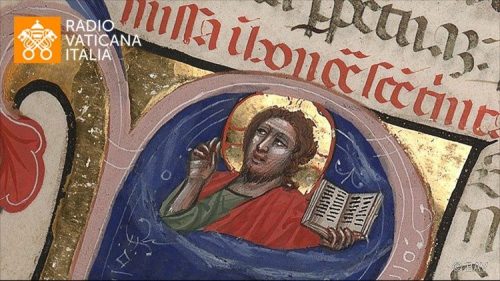READING OF THE DAY
JGS 13:2-7, 24-25A
There was a certain man from Zorah, of the clan of the Danites,
whose name was Manoah.
His wife was barren and had borne no children.
An angel of the LORD appeared to the woman and said to her,
“Though you are barren and have had no children,
yet you will conceive and bear a son.
Now, then, be careful to take no wine or strong drink
and to eat nothing unclean.
As for the son you will conceive and bear,
no razor shall touch his head,
for this boy is to be consecrated to God from the womb.
It is he who will begin the deliverance of Israel
from the power of the Philistines.”
The woman went and told her husband,
“A man of God came to me;
he had the appearance of an angel of God, terrible indeed.
I did not ask him where he came from, nor did he tell me his name.
But he said to me,
‘You will be with child and will bear a son.
So take neither wine nor strong drink, and eat nothing unclean.
For the boy shall be consecrated to God from the womb,
until the day of his death.'”
The woman bore a son and named him Samson.
The boy grew up and the LORD blessed him;
the Spirit of the LORD stirred him.
GOSPEL OF THE DAY
LK 1:5-25
In the days of Herod, King of Judea,
there was a priest named Zechariah
of the priestly division of Abijah;
his wife was from the daughters of Aaron,
and her name was Elizabeth.
Both were righteous in the eyes of God,
observing all the commandments
and ordinances of the Lord blamelessly.
But they had no child, because Elizabeth was barren
and both were advanced in years.
Once when he was serving as priest
in his division’s turn before God,
according to the practice of the priestly service,
he was chosen by lot
to enter the sanctuary of the Lord to burn incense.
Then, when the whole assembly of the people was praying outside
at the hour of the incense offering,
the angel of the Lord appeared to him,
standing at the right of the altar of incense.
Zechariah was troubled by what he saw, and fear came upon him.
But the angel said to him, “Do not be afraid, Zechariah,
because your prayer has been heard.
Your wife Elizabeth will bear you a son,
and you shall name him John.
And you will have joy and gladness,
and many will rejoice at his birth,
for he will be great in the sight of the Lord.
He will drink neither wine nor strong drink.
He will be filled with the Holy Spirit even from his mother’s womb,
and he will turn many of the children of Israel
to the Lord their God.
He will go before him in the spirit and power of Elijah
to turn the hearts of fathers toward children
and the disobedient to the understanding of the righteous,
to prepare a people fit for the Lord.”
Then Zechariah said to the angel,
“How shall I know this?
For I am an old man, and my wife is advanced in years.”
And the angel said to him in reply,
“I am Gabriel, who stand before God.
I was sent to speak to you and to announce to you this good news.
But now you will be speechless and unable to talk
until the day these things take place,
because you did not believe my words,
which will be fulfilled at their proper time.”
Meanwhile the people were waiting for Zechariah
and were amazed that he stayed so long in the sanctuary.
But when he came out, he was unable to speak to them,
and they realized that he had seen a vision in the sanctuary.
He was gesturing to them but remained mute.
Then, when his days of ministry were completed, he went home.
After this time his wife Elizabeth conceived,
and she went into seclusion for five months, saying,
“So has the Lord done for me at a time when he has seen fit
to take away my disgrace before others.”
WORDS OF THE HOLY FATHER
Man cannot save himself, and those who have had the pride to try, even Christians, have failed. For only God can grant life and salvation. This was the heart of Pope Francis’ homily at Holy Mass […] at the Chapel of Santa Marta.
The Pope drew upon the Readings of the day to remind those present that “the capacity to bestow life and salvation come only from the Lord”. “Many times”, he said, “the Scriptures speak about barren women, about sterility, about the inability to conceive and give life”. And yet many times “a miracle of the Lord” occurs and “these barren women are given to have a child”.
Pope Francis pointed to the example of Samson’s mother, whose story is recounted in the day’s first Reading from the Book of Judges (13:2-7,24-25a). He then recalled what happened to Sarah, the wife of our father Abraham: “she could not believe” that she could have a son at her advanced age “and she laughed behind the door of the tent where she was listening to what her husband was saying; she laughed because she could not believe it, but she had a son”.
Today’s Gospel (Lk 1:5-25), the Holy Father continued, reminds us of “what happened to Elizabeth”. These biblical stories about barren women show how “life is brought forth from the impossibility of giving life”. The Pope then noted that this also occurred with women who perhaps were not barren, but who no longer had any hope for their lives. “We think of Noemi, who ultimately had a grandchild”. Essentially, he said, “the Lord intervenes in the lives of these women to tell us: I am able to give life”.
Pope Francis then noted how the image of the desert is repeatedly used by the prophets. “The desert, arid land which is incapable of bringing forth a tree, fruit, or of making anything blossom”. And yet this very desert, he said, becomes a forest. “The prophets say: it shall be great, it will flourish!”. “The desert can flourish” and “the barren woman can give life” only through the Lord’s promise: I can do it! I can bring forth life and salvation from your barrenness! I can make fruit to grow from your aridity! It is the intervention of God that makes us fruitful, that gives us the ability to give life, that helps us along the path of holiness”.
One thing is certain, the Pope said: “we cannot save ourselves by ourselves”. “Even many Christians” have tried it, but only God’s intervention brings us salvation.
“What must we do for our part then?”, the Pope asked. First “we must recognize our own barrenness, our inability to bring forth life”. Then “we must ask,” saying to the Lord: “Lord, I want to be fruitful, I want my life to give life, I want my faith to be fruitful and to go forward and to give life to others. Lord, I am barren; I cannot do it, but you can. I am a desert; I cannot not do it, but you can”. This, he said, “should be our prayer in the days leading up to Christmas”.
Pope Francis then recalled how “the proud, those who believe they can do everything by themselves, are struck down”. The Pope pointed to Michal, the daughter of Saul. “She was a woman”, he said, “who was not sterile, but she was proud, and was not able to understand what it was to praise God, and in fact laughed at the praise that David gave to the Lord. And she was punished with sterility. Humility is necessary for fruitfulness. How many people like her imagine that they are just, and in the end they are poor souls”.
Humility, Pope Francis said, is what is truly important, the ability to say to the Lord: “Lord, I am barren, I am a desert”. And he concluded: “how important are the beautiful O Antiphons that the Church has us pray over the course of these days: O Son of David, O Adonai, O Wisdom, O Root of Jesse, O Emmanuel, come and give us life, come and save us, for only You can, alone I cannot. It is with this humility, the humility of the desert, the humility of the barren soul, that we receive grace: the grace to blossom, to bear fruit and to give life”.
(Santa Marta, 19 December 2013)

